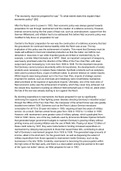“The economy must be prepared for war.” To what extent does this explain Nazi
economic policy? [30]
After the Nazis came to power in 1933, their economic policy was always geared towards
preparation for war through rearmament and the creation of a defence economy. However,
internal concerns during the first years of Nazi rule, such as unemployment, support from the
German Mittelstand, and inflation had to be addressed first before Nazi economic policy was
modified to fully focus on preparation for war.
Central to the Nazis’ preparation for war was the construction of a defence economy that laid
the groundwork for continued internal stability while the Reich was at war. The key
implication of this policy was the achievement of autarky. This meant that Germany must be
made self-sufficient in food and industrial production so that the nation can fulfil its own
demands in resources in war while imported goods are limited or restricted fully by, for
example, a similar Allied blockade as in WW1. Steel, an important component of weaponry,
was heavily prioritised under the direction of the Office of the Four-Year Plan, with steel
output each year increasing by 3.4m tons from 1936 to 1938. For the important resources
that Germany cannot produce abundantly within its boundaries, the developments of ersatz
products were necessary to replace these materials. Synthetic products such as acetylene
were used to produce Buna, a type of artificial rubber, to prevent reliance on rubber imports.
Whilst imports were being phased out in the Four-Year Plan, imports of strategic sectors
important for warfare, such as chemicals and metallurgy were nevertheless maintained,
albeit prioritised at the expense of agricultural imports. Ultimately, one of the main aims of
Nazi economic policy was the achievement of autarky, which they never truly achieved, but
the closest they reached to building an effective Wehrwirtschaft was in 1942-43, albeit when
the tide of the war was already starting to turn against the Reich.
By diverting expenditure to rearmament, the Nazis prepared for war by significantly
reinforcing the capacity of their fighting power. Besides directing Germany’s industrial output
through the Office of the Four-Year Plan, the manpower of the armed forces was also greatly
boosted even before 1936. Schemes such as the Reich Labour Service introduced
conscription for all 18 to 25-year-old males in 1935, requiring at least two years of military
service. As a result, German armed forces grew from 100k in 1933 to 1.4 million in 1939.
However, with rearmament came greater costs of military upkeep, which quadrupled from
1934 to 1938. Hence, one of the key methods used by Economics Minister Hjalmar Schacht
that generated larger government budgets to maintain Germany’s growing military without
printing money and causing inflation was the use of Mefo bills. Paying out about 12 billion of
these credit notes by 1937, they were instrumental in funding increased expenditure on
rearmament by delaying real payment to those that issued these bills, contributing to about
half of Germany’s rearmament program from 1933 to 1938. This generated large amounts of
income, albeit in the short-term, for the government, as well as disguising the extent of
military expenditure from those opposed to rearmament inside Germany, such as big
businesses in the late 1930s. Evidently, rearmament is becoming the preoccupation within
the high ranks of the Nazi party, and there is a clear pattern arising that pointed to the start
of the “guns not butter” stance, as Hitler prepares for war in 1942.




